Fostering
Fulfilling a vital role!
Hard as we might try, we are never going to be able to accommodate every animal that needs rescuing, we just don’t have the space. At both our rescue centres every nook and cranny is home to an animal of one sort or another… including the staff room and the office! Waiting lists grow. Animals arrive at our door, abandoned or stray, some may be cruelty cases, others old or infirm.
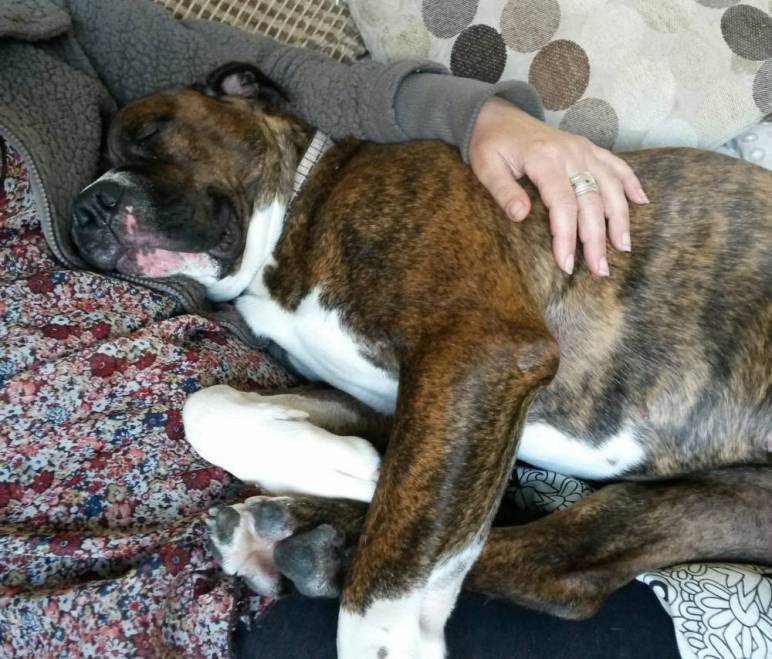
What do we do when there is no room, other than send them away to face possibly more suffering or even destruction?
This is where our foster families come in!
Foster families fill a vital role that the rescue is not equipped to meet. Foster families provide short term (sometimes long term) security for certain animals that would otherwise lose their lives. Foster families give freely of their time and their homes exercising their compassion to provide respite when it is needed most.
If you think that you may suit the role please read the further details below on fostering cats, dogs, kittens, puppies and other animals.
Once you are sure, we would love to hear from you. Just email us at foster@freshfields.org.uk stating what type of animal you are interested in fostering and confirming that you have read through our foster information on this site, please also include a contact telephone number so that we can call you. Please also complete this fostering application form for dogs, and for cats and/or Kittens complete Cat fostering application form and attach to your email.
Thank You
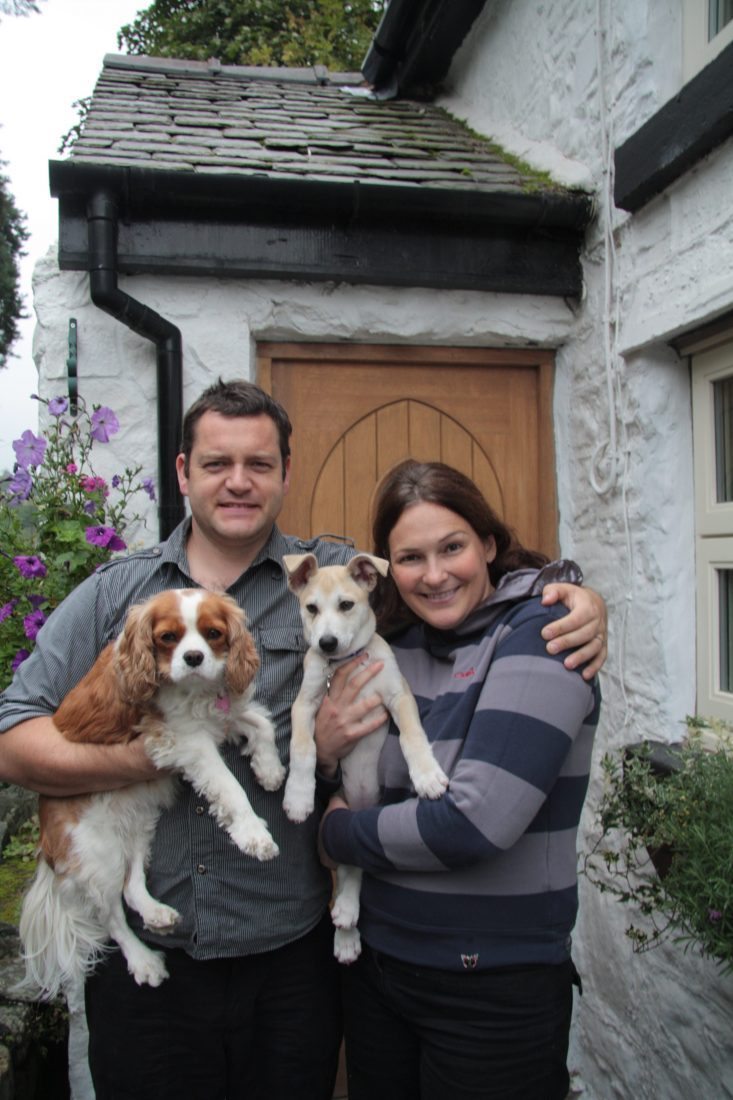
Fostering Cats
Emergency Respite for Adult Cats
Whilst most of our feline fostering requests are for kittens, pregnant mums or mums with kittens there are also instances when we desperately need to place adult cats. This can be for a number of reasons: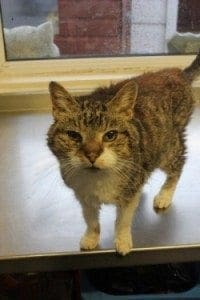
• Because we are so full we cannot possibly fit another feline into either of our centres.
• We have cat flu at the rescue and need to put a temporary ban on admitting and rehoming.
• A cat comes in that is elderly or ill and needs the comfort of a home environment to end it’s days.
Healthy, younger adult cats are generally neutered whilst in foster and remain in the home until a week after their second vaccination. Elderly, sick or infirm cats may well require a permanent foster home and you would be asked to commit to these animals for the rest of their lives.
Whichever the case, if a cat is in ‘foster care’ all medical bills are covered by the rescue as are any specialist foods. We don’t of course ever say no to contributions towards these costs. Vet cover will be provided either through our onsite vets (Liverpool only) or through one of the practices with which Freshfields holds an account. In both cases you would need to be able to provide transport to and from.
If you think that fostering adult cats might be for you then please drop us a line at foster@freshfields.org.uk . pleasure also complete the Cat Foster application Form Alternatively call us on the following numbers – Liverpool 0151 931 1604 or Wales 01286 880808
Please consider the following…
Do you have:
• Some experience of cats?
• Your own transport, to collect your cat/kittens from us?
• Your own transport to collect follow up supplies from us as required?
• Your own transport to attend veterinary appointments if necessary?
• Flexibility with your time and availability?
Are you able to provide:
• A quiet, stress free environment?
• A spare room?
Can you commit:
• Up to 3 months of your time to a mum and kittens?
• To spending time with mum cats?
• To spending time socialising kittens?
We do sometimes use foster families who have other pets and/or children however, it is vital that any foster animals are kept separate from your own pets and that you can provide a quiet stress free environment where your cat/kittens can relax and feel safe.
Fostering Dogs
A step in the right direction… for our dogs!

Sadly, and all too often, we find that for certain dogs we have no suitable space. It is then that we rely on the help of dedicated foster homes. Occasionally particular dogs find it difficult to cope in our busy kennel environment and, although we do everything we can to make their lives as comfortable as possible it is only a fosterer who can provide the calm, loving home life needed as rescue staff work towards securing each dog a more permanent future.

It doesn’t matter how big your rescue kennels might be, there will always be a queue of dogs waiting to find a space.
We are constantly on the lookout for caring people to offer foster homes to needy dogs. These dogs may require refuge in foster because they are stray or abandoned, a family member may be allergic or an owner may have sadly died. Others may require special attention if they are feeling stressed in our kennels and we need to see how they cope in a home environment or they may suffer from a medical condition which means they need that little extra TLC. We often find ourselves having to place dogs quickly as the alternative is unthinkable. In every case we will provide you with as much information as possible about your foster dog and will always take your situation and preferences into account.

It takes a special person to be a Fosterer, and we are eternally grateful to those that step up to the plate committing their time and their homes to saving lives that might otherwise be lost. Bringing a new animal into your home is not always straightforward or easy. There are no guarantees of perfection and as fosterers you must not baulk at a few hurdles. There may well be challenges and it’s important you are realistic and prepared for them, this is vital before you can commit wholly to the life we are about to place in your safekeeping. Fostering equals satisfaction, pride and fulfilment and this is born out of the achievement of having helped your foster dog find their forever home… these feelings regularly come only after a lot of hard work!
What Freshfields will provide:
• Veterinary and behavioural support
• All vet bills paid
• All of the food, bedding, equipment and advice you need to take care of our dogs
• Regular contact from our kennel staff
• Our heartfelt gratitude
What we look for in a Fosterer:
• Preferably experience and confidence with owning dogs.
• You will need your own transport and should live within a reasonable distance of the centre.
• Be home for all/most of the day. Some dogs you will be able to build up leaving time gradually.
• Older sensible children only, who have met our kennels staff and had their suitability assessed.
• Preferably no other pets, if there are pets they must be neutered and vaccinated and of a calm disposition.
• Be prepared to follow advice and procedures given by Freshfields kennel staff and attend any on-site vet appointments.
• Your garden/outside space will need to be fully secure
• Commitment. We need fosterers who will not give up on dogs after one bad night’s sleep or one toileting accident in the house.
• Ideally a fosterer will have access to a PC and equipment for taking photos of the dog in your home environment
• Have compassion and empathy for the dogs needs whilst accepting that our dogs won’t be with you permanently
• Able to nurse a sick or injured dog back to health
• A large dose of common sense to make judgement calls in certain circumstances.
Foster carers are undoubtedly vital to our work, but it’s important that before applying you please think carefully about the time and environment you have available and whether you truly feel able to offer temporary care to dogs who need it. If you do feel able, please complete our application form (below) as fully as possible. As with adoptees, suitable foster applicants will also need to undergo our standard home check. Please email your completed application form to foster@freshfields.org.uk
Download an application form HERE
Fostering Kittens
Providing a Safe & Secure Environment for those Important First Weeks
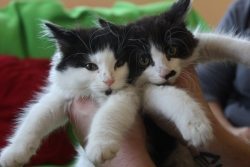 Un-neutered female cats come into season in January and February quickly attracting the attention of un-neutered male cats and hence breeding begins. Seasonal breeders cats typically give birth to two litters a year, in the spring and again later in the Summer. Pregnant for 9 weeks cats give birth to litters of between 2 and 6 kittens (occasionally as many as 7, 8 or even 9 kittens!) Mother cats usually come back into season again when their kittens are 6 weeks old and kittens can breed from 6 months old. Understandably there is a huge cat over-population problem!
Un-neutered female cats come into season in January and February quickly attracting the attention of un-neutered male cats and hence breeding begins. Seasonal breeders cats typically give birth to two litters a year, in the spring and again later in the Summer. Pregnant for 9 weeks cats give birth to litters of between 2 and 6 kittens (occasionally as many as 7, 8 or even 9 kittens!) Mother cats usually come back into season again when their kittens are 6 weeks old and kittens can breed from 6 months old. Understandably there is a huge cat over-population problem!
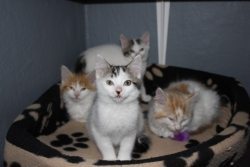 During kitten season we receive calls often daily requesting that we rescue mother cats with their kittens or orphaned kittens that have been discovered in gardens, under sheds, in derelict cars, on industrial sites, in empty buildings, behind shops and on demolition sites. This is on top of the regular calls received regarding stray cats, unwanted pet cats and abandoned pet cats. Freshfields also work with feral cat colonies neutering and returning or homing adult cats and homing their young litters of kittens which can be tamed.
During kitten season we receive calls often daily requesting that we rescue mother cats with their kittens or orphaned kittens that have been discovered in gardens, under sheds, in derelict cars, on industrial sites, in empty buildings, behind shops and on demolition sites. This is on top of the regular calls received regarding stray cats, unwanted pet cats and abandoned pet cats. Freshfields also work with feral cat colonies neutering and returning or homing adult cats and homing their young litters of kittens which can be tamed.
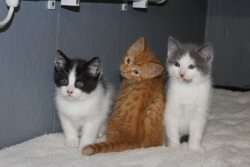 Each week the rescue receives numerous calls and that is why we need your help to accommodate and care for these needy young families until they can be found permanent new homes.
Each week the rescue receives numerous calls and that is why we need your help to accommodate and care for these needy young families until they can be found permanent new homes.
Fostering a mother cat and her litter of un-weaned kittens or fostering just orphaned kittens really helps the rescue because:
• You will be able to offer more space than a cage or cattery pen can provide.
• You can give more time and attention than can be given in one of our rescue centres.
• The cats and kittens are protected from the risk of catching cat flu or other contagious illnesses that it’s much harder to protect them from when in a rescue centre where sick cats and newly arrived strays and unwanted pets arrive sometimes daily.
*With orphaned kittens you also act as mum and help to wean and toilet/litter train them.
CRITERIA FOR HOUSING A FOSTER FAMILY:
A quiet spare room in which to keep or base your fostered mum and kittens is essential. If yours is a calm adult home and you do not have other pets you may wish to base your mum and kittens in another room such as the living room. Your own bedroom does not make an ideal room as a lively six week old litter jumping on your bed throughout the night is going to be a problem even though a newborn litter curled up with mum might not!
It is essential to keep your mum and kittens entirely indoors – they must not be allowed to go outdoors. Any room in which they are housed must have a securely closing door – if you have children you may wish to add a bolt on the outside to make doubly sure it won’t be accidentally opened. Open chimney’s must be sealed to prevent mum cat and kittens from exploring or hiding in them as should any holes in floorboards or skirting boards etc.
OTHER PETS:
Mother cats have very strong maternal instincts and can be very defensive/ hostile towards other animals so if you have other pets your fostered family must be kept separately from them. For disease control / health reasons your fostered family should be kept separately from other cats.
Your fostered family will not yet be fully vaccinated. Mum will not have had any vaccinations and kittens do not begin vaccinations until 9 weeks old. There are also other contagious viruses and illnesses that it is possible that your fostered family or your own cats could be carrying or incubating.
We also ask that any pets in the foster home are fully vaccinated and neutered.
SPENDING TIME WITH AND CARING FOR YOUR FOSTERED FAMILY:
If mum hasn’t had her babies when you take her on then she will need a calm loving environment that offers her affection but also allows her space. When the babies do arrive then initially all that will be required of you is to make sure that mum has plenty of food and a clean litter tray as tiny kittens will be curled up with her and require little if any input from you. These kittens will grow and develop rapidly though so an important part of fostering is handling and socialising them so that they grow up confident and friendly with people. You will need to be able to spend at least a couple of hours a day playing with and giving attention to mum and her kittens – for most people this is the enjoyable part of fostering and is easily accomplished.
If you work full time and are unable to come home in the middle of the day or do not have anyone else who can do so you can still help with fostering but may be better to consider fostering more independent adult cats.
EQUIPMENT REQUIRED:
Freshfields will provide litter trays, cat litter, bedding, toys, bowls and food for your fostered family. All that we ask is for you to collect these from us (and any top ups) as we simply do not have the resources to deliver.
Any other equipment you might require you should be able to acquire free or borrow from us. This can be discussed in more detail once you have made contact with the rescue.
Freshfields Animal Rescue provides all supplies and veterinary care for fostered cats and kittens. We will provide required veterinary care (via the rescue centre if fostering from Liverpool – you must be willing and able to travel to the centre if required) or at one of our account holding vets should either mum or her kittens become unwell during the time you are fostering any of the family.
More detailed and in depth advice on fostering cats and kittens along with ongoing telephone support is available for all accepted fosterers.
If you are seriously interested in fostering cats for Freshfields Animal Rescue and are happy to undergo our standard home check, please do drop us a line at foster@freshfields.org.uk stating which rescue you wish to foster from (Liverpool or Caernarfon) or give us a call on Liverpool 0151 931 1604, Wales 01286 880808. Please fill in Cat Foster application form
Thank You 🙂
Fostering Puppies
Extra information for potential puppy fosterers
This page should be read in conjunction with our Dog fostering page.
Fostering mum and pups: Although it doesn’t happen that often occasionally a pregnant bitch, or new mum nursing pups will arrive at one of our rescue centres and we will need to get her into a foster home as quickly as possible.
Although it doesn’t happen that often occasionally a pregnant bitch, or new mum nursing pups will arrive at one of our rescue centres and we will need to get her into a foster home as quickly as possible.
Fostering a mother dog and her puppies is a huge job with a potentially long foster term (sometimes 8 to 10 weeks to get the puppies big and healthy enough for adoption). Fostering a nursing mother and her puppies is not for everyone although the rewards of watching mum care for her pups and of helping those pups develop into healthy, happy dogs is immense!
Foster Criteria:
 • A spare room which is quiet where mum can nurse and feel safe
• A spare room which is quiet where mum can nurse and feel safe
• No other animals as mums can be very protective over their young pups
• Experience and understanding of dogs. There will come a time when mum will start to find the pups very hard work and she will need time away from them. She will need to feel secure to the degree that it is safe to leave her pups unattended
• Fostering mum and pups can be a messy job so it needs someone who is completely committed
• No young children
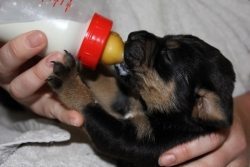
Fostering a litter without mum:
Raising a litter without mum is a very tough but rewarding job. It’s important to remember that until around 3-4 weeks old, mum would normally be doing everything for the pups. If mum isn’t there then you, the fosterer must take on that role!
This means a regular schedule of appropriate feeding, cleaning, playing and sleeping in a happy and healthy environment.
It can be a very positive experience but requires a complete commitment of your time and care. In our experience fostering a litter without mum places a great demand upon the fosterer!
Foster Criteria:
• We would be looking for someone who has a spare room or a safe area where the pups can be
• We would prefer there to be no other animals in the household unless they have had experience and can tolerate a litter
• Someone needs to be home all/most of the day
• No young children
• This can be a very messy job so not for the faint hearted
Hand rearing pups:
Hand rearing pups is the most time consuming but rewarding job you could undertake as a fosterer. Newborn pups need to be fed every 2 hours, this includes through the night so it can also become a very exhausting experience. For the first few weeks of their lives they cannot urinate or defecate on their own ( mum would normally stimulate them by licking), we mimic this using cotton wool to encourage them to go to the toilet. Any fosterer considering hand rearing needs to not only have the time to put into the pups but also be able to nurture them as they grow.
Hand rearing pups has so far only ever been undertaken by the staff at Freshfields, therefore we would only consider people who have previous experience of hand rearing as it is such a tough challenge.
If you haven’t been put off by any of the above and you believe you fit the bill then please do get in touch, you can call us on Liverpool 0151 931 1604, Wales 01286 88-0808 or email foster@freshfields.org.uk
Thank You
Fostering Other Types of Animal
Help Needed on an As and When Basis
Although Cats and Dogs are the animals for whom we are constantly in need of foster families there are on occasions others that might require emergency care. There is no way of predicting what type of animals these might be or when we might need that help, but we have in the past requested help with the following:
• Mice
• Degu’s
• Lama’s
• Guinea Pigs
• Horses & Ponies
If you are available to help with any of these please note that this type of fostering is only available when specifically advertised for, please keep an eye on our Wanted Page where we will request help as and when needed.
Thank You
Donate Here
Lost & Found Pets

Merchandise
Exclusive merchandise available direct from the rescue. Don't miss out, follow the link to make your purchase today.


